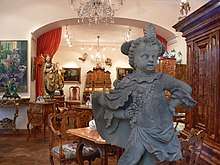Art and antiques shopping
There is no universal definition for which manufactured items are antiques. Some tax agencies define goods older than 100 years as antiques.
The definition has geographic variations, where the age limit might be shorter in places such as North America than in Europe. Handicraft products might be defined as antiques, though they are younger than similar mass-produced goods.
In some jurisdictions, antique motorcars may legally qualify as historic vehicles after as little as twenty-five years and a few buildings may be eligible for a spot on a historic register after fifty years – but only if there are other substantial, documented reasons for their historic notability. This broader definition includes some ephemera and nostalgia pieces from the twentieth century, including the Great Depression and the post-war 1950s. An automobile from the Roaring Twenties, if it is still in operable, showroom condition today, is indeed an antique.
Concerns

There are legal restrictions on various sorts of goods which may be sold as antiques:
- Trade in material from endangered species, such as ivory or crocodile skin, is prohibited in many countries, and there are treaties which prohibit import to most countries. While a few narrow exceptions allow the non-commercial import of manufactured items you already own, typically century-old antiquities acquired long before the treaties came into force, the rules are complex and any mistake in the import procedure could allow authorities to help themselves to otherwise-lawful items which are rightfully yours.
- Some countries prohibit export of all items older than a certain date. For example, China prohibits export of anything older than the end of the Qing Dynasty in 1911.
- Commercial exchange of archaeological artifacts is also prohibited in many countries.
- If you settle somewhere and buy property, there may be restrictions on the renovations you can do if the place is a historical building.
- Ownership and transportation of antique firearms can be restricted; at least for those that are still functional. Some laws also apply to knives and other hand-to-hand weapons.
- Some countries may require a written appraisal of antique objects to receive an export permit, an appraisal that can be costly. The appraisal and export permit is then required by some countries to gain an import permit for antique objects. When (re)selling antique objects, the appraisal and permits may be required to validate legality of the antique objects.
Knowing the local rules is important. In some cases exceptions may be allowed with appropriate permits, but in general violating these rules can lead to loss of the goods and other consequences – being prohibited from visiting the country again, a fine, or in some cases even a prison term.
Antique stores and auctions usually add a commission on top of the announced price; which can be up to 25 per cent.
Art and antiques usually follow tax laws different from consumer goods. For art and antiques of significant value, the buyer should get a receipt for future tax reports.
Transporting large or fragile antiques can be more challenging then normal souvenirs. Ensure your items are not exposed to extreme temperatures, harsh light, or rough shocks while transporting them back.
The terms authentic or genuine (in contrast of replica, forged, etc) are very contextual. When it comes to jewelry, it implies they are made by noble metals and gemstones, instead of cheaper materials. For furniture, it implies that they are crafted before industrial times; in contrast to mass-produced goods in similar style.
See also
- Archaeological sites
- Bargaining
- Common scams
- European art
- Modern and contemporary art
- Nostalgia and historical travel
- Visual arts